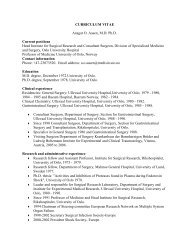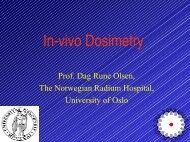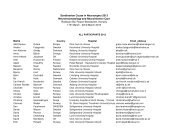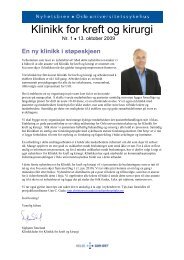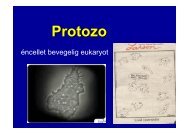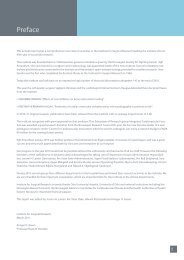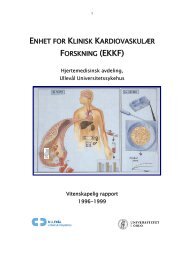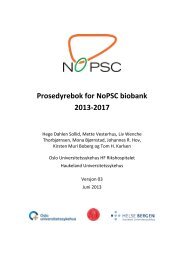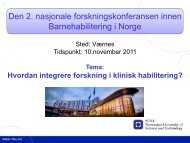Novel genetic and epigenetic alterations in ... - Ous-research.no
Novel genetic and epigenetic alterations in ... - Ous-research.no
Novel genetic and epigenetic alterations in ... - Ous-research.no
You also want an ePaper? Increase the reach of your titles
YUMPU automatically turns print PDFs into web optimized ePapers that Google loves.
ABSTRACTColorectal cancer (CRC) is one of the major cancer killers <strong>in</strong> the world, <strong>and</strong> any factor thatbetter p<strong>in</strong>po<strong>in</strong>t patients with a poor prog<strong>no</strong>sis may result <strong>in</strong> a prolonged life expectancy for alarge number of cancer patients.In order to identify <strong>no</strong>vel prog<strong>no</strong>stic markers a literature survey followed by a criticalselection of tumorigenic genes were performed. We analyzed frameshift mutations <strong>in</strong> 41genes with mostly cod<strong>in</strong>g mo<strong>no</strong>nucleotide repeats <strong>in</strong> two tumor series with a total of 202microsatellite <strong>in</strong>stable (MSI) colorectal tumors us<strong>in</strong>g capillary electrophoresis. The resultswere confirmed by sequenc<strong>in</strong>g <strong>in</strong> a r<strong>and</strong>om subset of the genes <strong>and</strong> tumors.In total, the two series of MSI-tumors carried a mean number of 17 <strong>and</strong> 19 mutations,respectively. A strong association was seen between low mutation load <strong>and</strong> rectal location,both for <strong>in</strong>dividual genes (ACVR2A, ASTE1, CASP5, MARCKS, MBD4, MRE11A,MSH3, TAF1B <strong>and</strong> TFGBR2) as well as across all genes (P = 0.008).Univariate survival analysis revealed that mutation <strong>in</strong> RCC2 was associated with an <strong>in</strong>creasedfive-year disease-free survival <strong>in</strong> both tumor series (P = 0.035 <strong>and</strong> 0.011, respectively). Thisf<strong>in</strong>d<strong>in</strong>g was confirmed us<strong>in</strong>g multivariate analyses even with the <strong>in</strong>clusion of the strongestk<strong>no</strong>wn predictor of prog<strong>no</strong>sis to date, tumor stage at time of diag<strong>no</strong>sis (P = 0.028 <strong>and</strong> 0.021,respectively).In conclusion, analysis of an (A)10 repeat <strong>in</strong> RCC2 us<strong>in</strong>g readily available tech<strong>no</strong>logy ref<strong>in</strong>esdeterm<strong>in</strong>ation of prog<strong>no</strong>sis <strong>in</strong> a group of MSI tumors. This may be useful <strong>in</strong> a future choiceof treatment for stage II MSI-tumors.2





